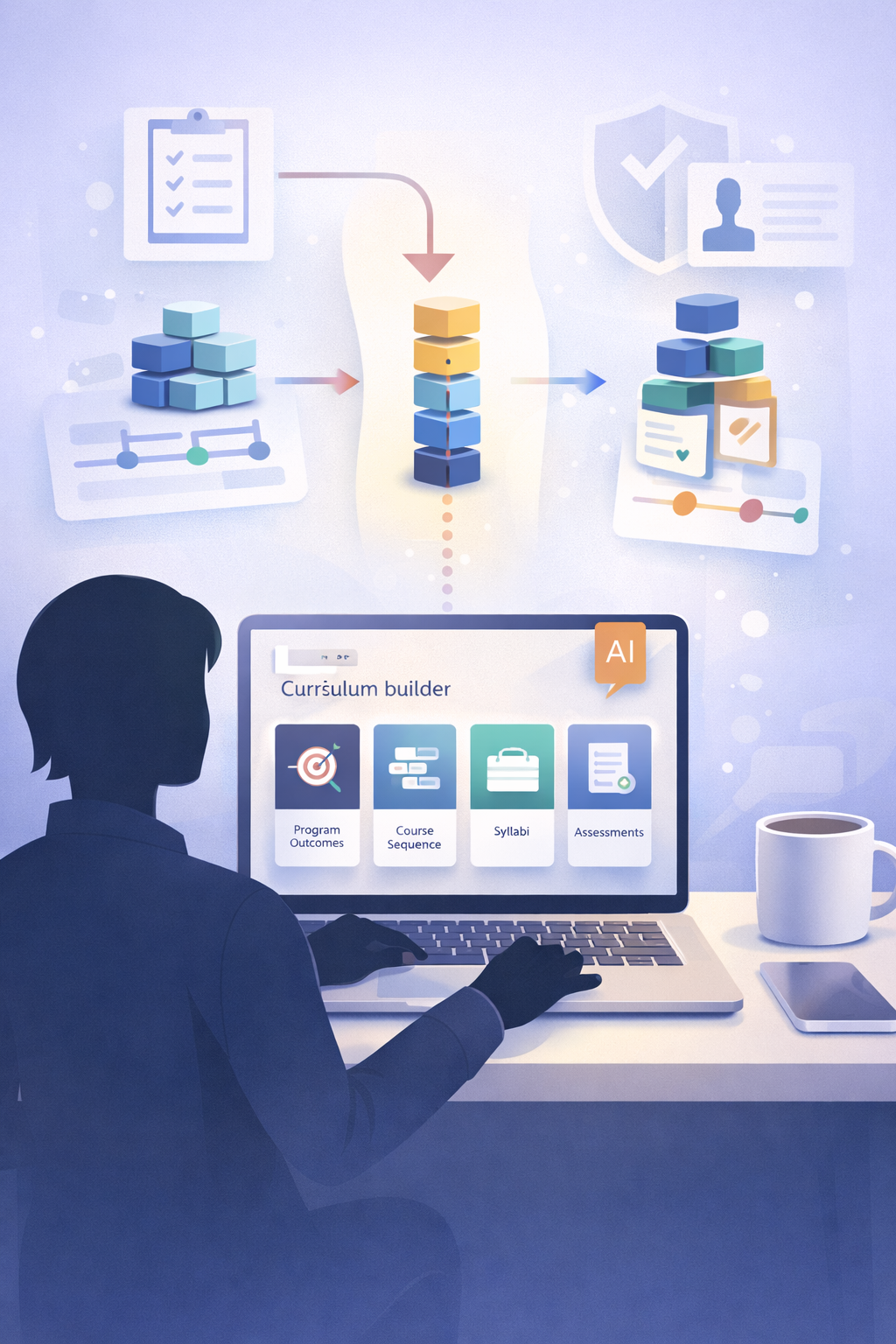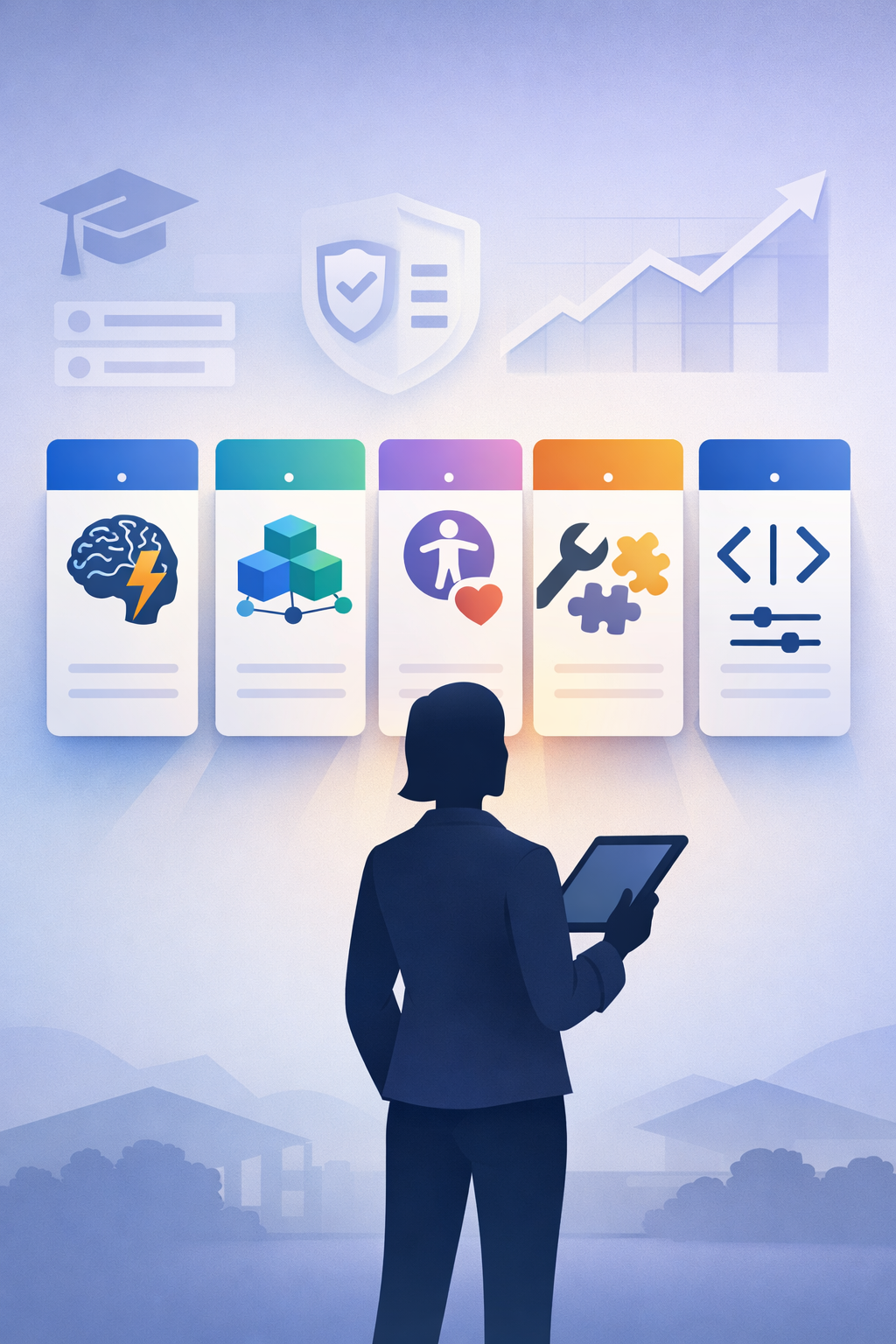AI-Powered Curriculum Development: How New Universities Can Build Accreditation-Ready Programs in Weeks, Not Months
University License Series 1: Curriculum

So you’ve finally decided to open your university. Congratulations!
All things aside, how do you prepare your license application to operate in the States?
This would be one of the most fundamental and perhaps overwhelming steps in your journey. This is why I’m dedicating this series of posts to just that: university licensing.
In this first blog post of the series, I’ll discuss some aspects of preparing your academic curriculum for the application. I’ll touch upon the development process and regulators’ expectations among a few other things.
Remember, you can always reach out to me if you have more questions about university licensing or anything else. Just drop me an email or call!
Preparing Your License Application
Step 1: Choose Your State
Your first and foremost step in this process would be to decide on a state where you will be applying for your university license. This one is important because application requirements and costs vary from state to state.
Deciding on which state works best for your scenario can be challenging. My team and I can advise you on what states are best for your circumstances after carefully analyzing your specific situation. Just give us a call to book your consultation.
Step 2: Educational Programs Curriculum
This is where you will start to prepare your application. Your first building block and the cornerstone of your application will be your program’s curriculum, and this really goes back to your initial goals and mission statement.
When you decided to start your university, you must have done so because you saw an unmet need or an area of study that wasn’t as vastly covered but that could be proven to provide employable skills to your prospective students.
Perhaps you were driven to start because you’ve developed a unique curricular focus or improved teaching methodologies in a certain academic field.
Whatever it was, now’s the time to use your observations and developed processes by creating a true curriculum program. If you don’t know where to start, research and identify the most desirable programs in the United States and pick the top two as a starter. I strongly advise starting with only two programs.
Curriculum Development Process
- Hire subject matter experts in your chosen field of study. These should typically be your faculty members, however, if you still haven’t hired faculty, you can hire part-time SMEs with experience in curriculum design.
- Conduct research that identifies key issues and pinpoints trends in your content area, both within the district and across the nation. This research will allow your curriculum designers to develop a unique philosophy and a needs assessment.
- When it comes to the needs and issues assessment, your curriculum developers would have to gather tons of information that includes desired outcomes and expectations of a high-quality program, concerns, and attitudes of teachers, students and administrators, and other elements. Your faculty will then carefully examine this data to pinpoint areas of improvement that should shape your curriculum design.
- Articulate a philosophy for your educational program. These are some of the questions that could guide you:
- Upon what values and guiding principles is our program built?
- What are our core beliefs and mission statement?
- Why learn this specific discipline?
- How is the assessment used to improve student learning and program outcomes?
- Define your program goals. Remember that a great set of program goals has the following characteristics:
- Each goal naturally stems out of the philosophy for a given discipline, and that linkage is clear;
- Each goal focuses on continuous growth and learning;
- Each goal is realistic;
- The number of goals is manageable - somewhere between 4 and 8 to be ideal.
- Identify resource materials that could assist with program implementation. This means looking for available instructional resources that could help you meet a particular goal in your curriculum development process.
Bear in mind that in the modern-day world, academic professionals are moving away from a single textbook approach and are instead using a broad range of instructional modules and supplementary materials in their teaching curriculum.
- Develop the right assessment tools to measure student progress. This one is crucial. In many curriculums, performance-based tasks, final examinations, and grade-level tests usually determine a student’s program-related knowledge. Incorporating effective assessment instruments into your program will essentially drive your curriculum as a whole.
What Do Regulators Expect To See In Your Curriculum?
Here are some basic requirements that will be expected by your regulator:
- Full title on each awarded degree
- A specific major field of study in each degree title (in addition to the general titles such as BA, MS, etc.)
- Clear student admission requirements
- The type of general education required for associate and bachelor degrees
- Graduation requirements
- Method of instruction: on-campus, online, or hybrid
Program Learning Outcomes
Your program learning outcomes are probably the most pivotal point in your curriculum development. PLOs are the skills and knowledge that are specific to a particular academic program.
They depict some broad aspects of what the student should know or be able to do upon program completion. These are not to be confused with institutional Learning Outcomes (ILOs) or Course Learning Outcomes (CLOs).
Closing Thoughts
Unfortunately, I frequently see how curriculum development becomes one of the most neglected steps of establishing a post-secondary institution. You can build a large campus with state of art buildings, sports arenas, and libraries - but your curriculum will remain to be the most foundational aspect of your institution’s reputation and success.
That’s because your curriculum is that factor that will dictate what type of building you need to have, or how large your library and lecture rooms should be, among other things.
So my strong advice is this: start with the curriculum. Hire an expert to help you develop your curriculum and allow them to express their creativity when doing that. Put innovative ideas, processes, and methodologies at the core of this process. After all, it is exactly your curriculum that will bring students to your university.
Do you plan to open your university in the USA? Contact us now to get the best help you can.
For personalized guidance, feel free to reach out to Expert Education Consultants via email at info@experteduconsult.com with any questions you may have. This service is complimentary.
To explore customized solutions tailored to your specific needs, schedule a personalized one-on-one paid consultation with Dr. Sandra Norderhaug here.











